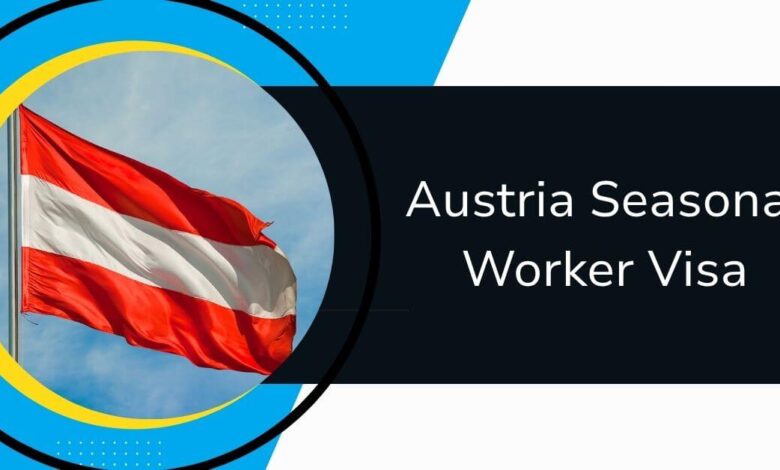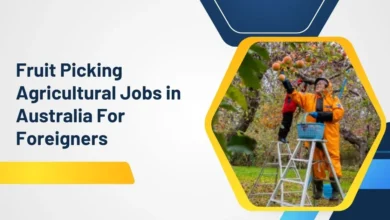Austria Seasonal Worker Visa 2026

Austria, known for its beautiful landscapes and high-quality work environments, offers opportunities for seasonal work in sectors such as agriculture, tourism, and forestry. The Austria Seasonal Worker Visa allows individuals from non-EU countries to work temporarily in these industries.
This visa, designed to cater to the needs of temporary workers, is usually issued for a period ranging from six to nine months annually, aligning with the specific seasonal demands of the country’s economy.
Who Can Apply for Austria Seasonal Worker Visa?
The Austria Seasonal Work Visa is intended for citizens of non-EU countries who wish to work temporarily in Austria in certain sectors such as agriculture and tourism. This visa is designed to fill seasonal labor shortages in industries like harvesting, hospitality, and tourism.
Eligibility Criteria:
- Non-EU Country Citizens: Only individuals from non-EU countries are eligible for this visa. Citizens of EU or EFTA (European Free Trade Association) countries do not require a seasonal worker visa to work in Austria.
- Job Offer from an Austrian Employer: You must secure a valid job offer from an Austrian employer in eligible industries such as:
- Agriculture & Harvesting: Includes viticulture (grape growing), fruit picking, farming, animal husbandry, and forestry work.
- Tourism & Hospitality: Positions in food services, hotels, leisure facilities, travel agencies, and entertainment venues.
- Work Permit Application by Employer: Your employer is responsible for applying for a work permit on your behalf. This permit allows them to hire you as a seasonal worker legally.
- Visa Application After Work Permit: After securing the work permit, you must apply for either a Visa C (for short-term stays) or Visa D (for long-term stays).
- Financial Stability: You will likely need to demonstrate that you can support yourself financially during your stay in Austria, especially if your employer does not provide full accommodation or benefits.
Additional Considerations:
- Special Circumstances: In some cases, if you have previously worked in Austria under a different visa or permit, your application process might vary. It’s important to consult the Austrian embassy for specific advice regarding your situation.
- Visa Denials: Visa applications can sometimes be denied due to incomplete documentation or failure to meet the visa requirements. Be sure to follow the guidelines strictly, and if necessary, seek the advice of an immigration consultant.
Visa Types: C vs. D:
When applying for the Austria Seasonal Worker Visa, it’s essential to understand the differences between the two types of visas, as they depend on the length of your employment and stay in Austria.
Visa C: Short-Term Visa (up to 90 days):
- Duration: Allows you to stay for up to 90 days within a 180-day period.
- Best for: Workers whose seasonal employment lasts less than 90 days (e.g., short-term agricultural work or tourism).
- Cost: €60
- Limitations: This visa is valid only for short-term stays and may not be extended.
Visa D: Long-Term Visa (more than 90 days):
- Duration: Valid for stays of more than 90 days up to five years.
- Best for: Workers employed for seasonal jobs that last more than three months, such as those who work in agriculture for the entire growing season or in tourism during peak periods.
- Cost: €100
- Renewability: This visa can be renewed for multiple years, provided that you continue to meet the work requirements and the job remains seasonal.
Detailed Application Process:
Applying for the Austria Seasonal Worker Visa involves several important steps. By following this process carefully, you can increase your chances of a successful application.
Step 1: Find a Job in Austria:
The first step in obtaining a seasonal work visa is securing a job. To qualify for this visa, you must have a legitimate job offer from an Austrian employer in one of the eligible sectors (agriculture, tourism, etc.).
- Tips for Finding a Job:
- Online Job Portals: Many job offers can be found on international and Austrian job portals such as AMS, EURES, or other regional job boards.
- Networking: Reach out to companies directly, or use recruitment agencies that specialize in seasonal employment for foreign workers.
- Employers’ Responsibility: It is crucial that your employer applies for your work permit, as the application process can only begin once they’ve submitted the necessary paperwork to the AMS.
Step 2: Your Employer Applies for the Work Permit:
After receiving a job offer, your employer will apply for a work permit on your behalf through the Austrian Public Employment Service (AMS). This is a legal requirement and part of the formal hiring process.
- Work Permit Requirements: The AMS will review the application and assess whether there are no suitable workers within the EU to fill the job. Once approved, the AMS will issue the work permit.
- Timeframe: Processing times for work permits typically range from 4 to 6 weeks, depending on the complexity of the job and the number of applications being processed.
Step 3: Apply for the Visa:
Once your work permit has been issued, you can apply for either a Visa C or Visa D based on the length of your employment. To apply, you will need to visit the Austrian embassy or consulate in your home country.
- Documents Required:
- Valid passport
- Work permit issued by AMS
- Proof of employment (contract)
- Proof of accommodation in Austria
- Evidence of sufficient financial means
- Health insurance coverage for the duration of your stay
- Processing Time: The processing time for a visa application is generally 6 to 8 weeks.
Check Also; Employment Seekers VISA Austria – Eligibility Check
Visa Costs and Fees:
- Visa C (Short-Term Visa): €60
- Visa D (Long-Term Visa): €100
These fees are payable at the time of your application submission. Be sure to check if there are any additional processing or administrative fees.
What to Expect After Arrival:
Once you arrive in Austria and start working, here are a few things to keep in mind:
- Registering with Local Authorities: Within three days of your arrival, you must register with the local authorities at the municipality office in the area where you will be living.
- Health Insurance: Ensure that you have adequate health insurance coverage. Some employers may offer insurance, but you must verify this beforehand.
- Accommodation: Many employers provide temporary accommodation for their seasonal workers, but it’s important to confirm this in advance. Otherwise, you will need to secure your own housing.
- Employment Rights: As a seasonal worker, you have the same basic rights as other employees, including protections against unfair dismissal and access to labor rights under Austrian law.
Conclusion:
The Austria Seasonal Worker Visa provides a great opportunity for non-EU citizens to gain valuable work experience in some of Austria’s key industries, like agriculture and tourism. By securing a job in advance and following the application steps, you can experience life in Austria while earning money during the peak seasons.
Frequently Asked Questions:
Who can apply for the Austria Seasonal Work Visa?
People from outside the EU who want to work seasonally in fields like tourism and agriculture can apply, as long as they have both the work pass and the visa they need.
What sectors are covered under the Austria Seasonal Worker Visa?
Agriculture, forestry, and tourism are all sectors that include activities like harvesting, hospitality, and other services that are connected.




